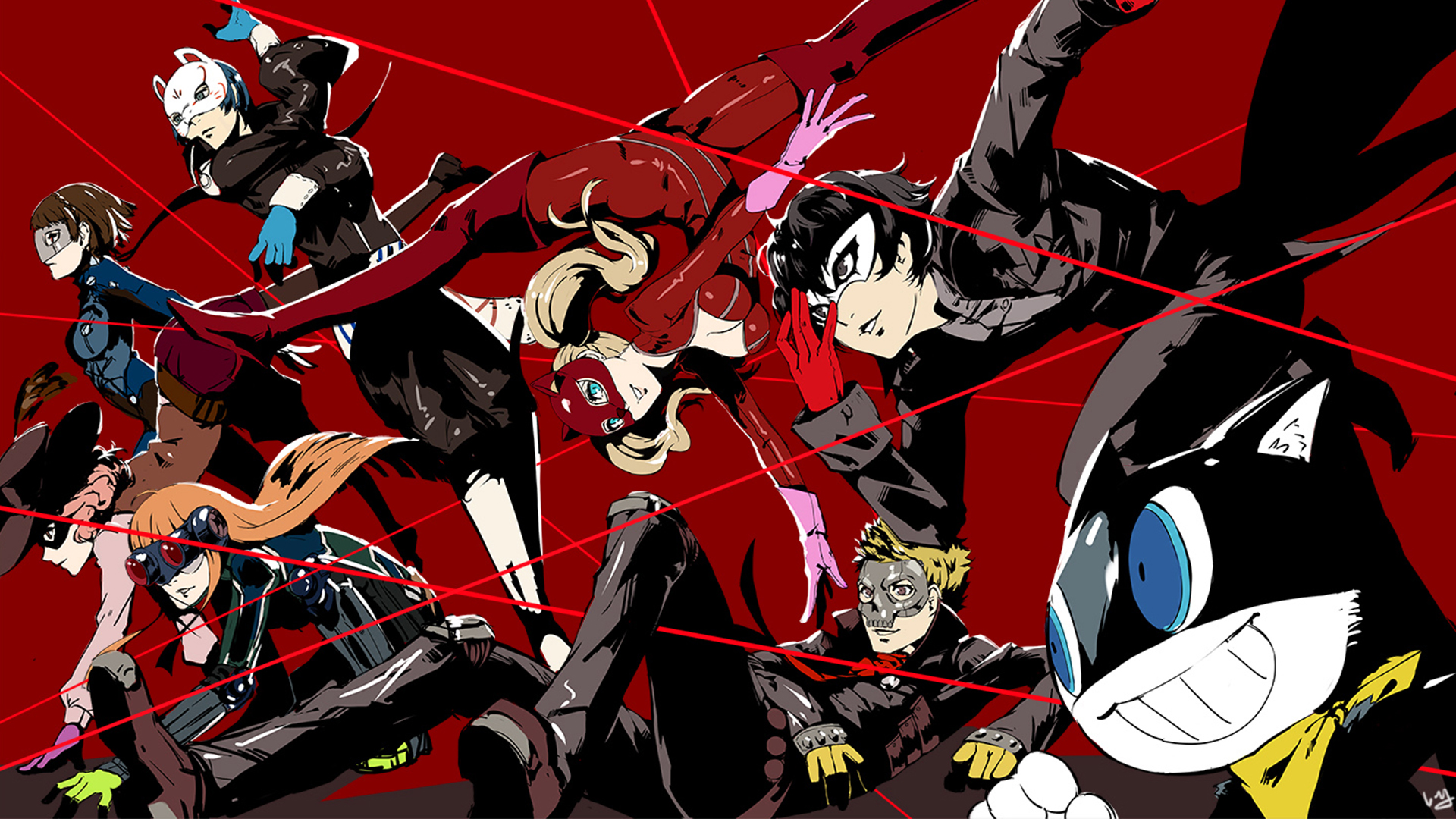Phantom Thief Joker (5e Class)
Phantom Thief (UNFINISHED)[edit]
Phantom Thieves are considered champions of the people, wielding mystical powers known as personas to protect innocents while stealing the hearts of the wicked.
Thief Origin[edit]
Phantom Thieves can come from many backgrounds, the only uniting factor being that they're all individuals who defy the fate that was chosen for them. They're individuals who rebel against the corrupt system in place and always strive for a better future.
Creating a Phantom Thief[edit]

|
|---|
| Phantom Thieves In Action! Source |
- Quick Build
You can make a Phantom Thief quickly by following these suggestions. First, Charisma should be your highest ability score, followed by Dexterity.
Class Features
As a Phantom Thief you gain the following class features.
- Hit Points
Hit Dice: 1d10 per Phantom Thief level
Hit Points at 1st Level: 10 + Constitution modifier
Hit Points at Higher Levels: 1d10 (or 6) + Constitution modifier per Phantom Thief level after 1st
- Proficiencies
Armor: None
Weapons: None
Tools:
Saving Throws: Charisma, Dex
Skills: Choose 4: Acrobatics, Sleight of Hand, Deception, Persuasion, Intimidation, Stealth, Survival, Perception, Insight.
- Equipment
You start with the following equipment, in addition to the equipment granted by your background:
- If you are using starting wealth, you have 4d4x10 in funds.
| Level | Proficiency Bonus |
SP | Features |
|---|---|---|---|
| 1st | +2 | 25+your Charisma modifier | — |
| 2nd | +2 | 30+your Charisma modifier | — |
| 3rd | +2 | 35+your Charisma modifier | — |
| 4th | +2 | 42+your Charisma modifier | Ability Score Improvement |
| 5th | +3 | 50+your Charisma modifier | — |
| 6th | +3 | 59+your Charisma modifier | — |
| 7th | +3 | 70+your Charisma modifier | — |
| 8th | +3 | 77+your Charisma modifier | Ability Score Improvement |
| 9th | +4 | 85+your Charisma modifier | — |
| 10th | +4 | 92+your Charisma modifier | — |
| 11th | +4 | 101+your Charisma modifier | — |
| 12th | +4 | 113+your Charisma modifier | Ability Score Improvement |
| 13th | +5 | 122+your Charisma modifier | — |
| 14th | +5 | 130+your Charisma modifier | — |
| 15th | +5 | 139+your Charisma modifier | — |
| 16th | +5 | 145+your Charisma modifier | Ability Score Improvement |
| 17th | +6 | 153+your Charisma modifier | — |
| 18th | +6 | 160+your Charisma modifier | — |
| 19th | +6 | 170+your Charisma modifier | Ability Score Improvement |
| 20th | +6 | 180+your Charisma modifier | — |
Persona[edit]
Beginning at 1st level, you awaken your persona. Choosing from Arsene, Zoro, Captain Kid, Carmen, Goemon, Johanna, Necronomicon, Milady, and Cendrillion. Your persona acts alongside you and gets stronger as you level up in your class. When you take an action, bonus action, or reaction, you can command your persona to do so.
Thievish Resilience[edit]
Beginning at 1st level, you're accustomed to using your persona in combat and maneuvering around with it. Your AC is calculated with 10 + Your Dexterity Modifier. When your persona is out you also add your Charisma Modifier.
SP[edit]
At 1st level, you possess a number of SP relevant to your level in the above sheet. You use your SP to utilize actions using your persona which will be listed on the persona's page. You regain half SP on a short rest, and all SP on a long rest, but can also regenerate SP using various items that would boost your stamina.
Cognitive Ammo[edit]
Beginning at 1st level, ranged weapons you wield are fueled entirely through the perception that your opponents may view of it. Because of this, you cannot reload your weapons normally in combat. Rather you begin each fight with a full clip. Since no one would expect someone to enter a fight without a loaded weapon. Because of this cognition altering your weapon's bullets. Your weapon also strengthens as your reputation goes up. The damage scaling based off of how dangerous others would view said weapon due to your reputation (DM Discretion.)
Persona Negotiation[edit]
At 2nd level, you've learned to convert and add new spirits to your repertoire. When encountering a spirit, or a defeated or willing individual. You may attempt to convince or force them to join you. Becoming a new mask that joins your arsenal of personas. When faced with a defeated enemy or a willing target, you may either persuade or threaten them into joining you. Persuading them requires a persuasion check if they understand your language, or an animal handling check if they're a non intelligent creature that doesn't understand your language. Threatening requires a intimidation check regardless if they understand your language or not. The DC will be set by the DM depending on how they consider the target's willingness to join you. They may also set the DC as an impossible one if they believe the target cannot be persuaded or threatened. They may also not even require a roll if the target is already willing to join you. But regardless of the method, upon convincing the target to join you, they become a mask of varying rarity depending on the level or CR of the target. You may switch between persona's on your turn as a free action but can only switch once per turn. Finally the amount of mask you can hold is equal to your proficiency bonus excluding your starting persona.
When acquiring a persona you roll a d100 to determine the rarity. A common persona would be any persona who's starting level is 1-12. Uncommon would be level 13-25 personas. Rare would be level 26-37 Personas. Super Rare would be level 38-50 personas. Epic Rarity would be level 51-70 personas. Legendary rarity would be level 71-83 personas. Mythical Rarity would be level 84-93 personas. Once the rarity is determined, your GM will either choose one from the list to give you, or have you roll a random one from the list. The chances of the persona you can roll are determined by the creature's level or CR.
Level 1-3 or CR 1-5: 1-70 = Common Persona. 71-95 = Uncommon Persona. 96-100 = Rare Persona.
Level 4-6 or CR 6-10: 1-40 = Common Persona. 41-80 = Uncommon Persona. 81-98 = Rare Persona. 99-100 = Super Rare Persona.
Level 7-9 or CR 11-14: 1-20 = Common Persona. 21-45 = Uncommon Persona. 46-75 = Rare Persona. 76-95 = Super Rare Persona. 96-100 = Epic Persona.
Level 10-13 or CR 15-19: 1-25 = Uncommon Persona. 26-45 = Rare Persona. 46-70 = Super Rare Persona. 71-90 = Epic Persona. 91-100 = Legendary Persona.
Level 14-17 or CR 20-24: 1-20 = Rare Persona. 21-40 = Super Rare Persona. 41-65 = Epic Persona. 66-85 = Legendary Persona. 86-100 = Mythical Persona.
Level 18-20 or CR 25-30: 1-40 = Epic Persona. 41-75 = Legendary Persona. 76-100 = Mythical Persona.
You may only convert a creature into a mask a number of times equal to half your proficiency bonus rounded down per long rest.
Third Eye[edit]
When you reach 2nd level, awaken your third eye which allows you to search for various clues and items to help you on your journey, You gain 30 ft of blindsight gain advantage on perception checks as well as investigation checks to find hidden items or traps.
Qualifications of A Thief[edit]
Starting from 2nd level, your awakening as a phantom thief has allowed you to become extremely adept at hiding in the shadows and striking your targets when they least expect it. You gain expertise in stealth and roll it with advantage against targets who aren't aware of your presence. You may also treat half cover as total cover for the purpose of being hidden from enemies.
Ambush[edit]
Starting from 3rd level, you make the most out of a surprise attack against a target. Upon triggering a surprise round, you gain a bonus to your initiative equal to your proficiency bonus when determining the order of attacks.
Steal Your Heart[edit]
Starting from 3rd level you gain the ability to steal the corrupt desires of certain individuals. As an action in combat you may attempt to steal the greatest treasure of a target with an evil alignment, their corrupt desires. Pulling their treasure out from their body which will take the form of a replica of an item that the target considers most precious to them. Doing so requires a contested charisma saving throw against the target, successfully stealing their treasure on a successful save. On a failed save however the target will become immune to this ability for the rest of combat unless you can willingly make them relinquish their treasure.
It's important to weaken a target when attempting to steal their treasure, as trying to steal the heart of a healthy individual is doomed to fail. While the target has more than 75% of their HP, they gain a +5 bonus to the charisma save. At 50% HP or lower they roll the save normally. At 25% or lower they receive a -3 penalty to the charisma save. If the target is at 1 HP or downed they receive a -5 penalty to the charisma save. The DM may also give the target a bonus to the charisma save if the DM determines the target's heart is considered pure evil and too far gone to be stolen. Upon successfully stealing the target's treasure, their alignment will immediately become neutral, unable to switch to evil ever again but may switch to good if the right conditions are met. The target is also filled with unimaginable guilt for all the pain they've caused, wanting nothing more than to make amends for all the evils they've caused others.
Calling Card[edit]
Any thief can steal something. Only the greatest of thieves can declare what they're intentions are yet still successfully initiate their crime. Starting from 3rd level you may send a calling card to the target you intend to steal the heart from a day in advance. Upon reading the calling card their distorted desires will become much easier to steal as they become aware that their treasure is being targeted. For the rest of that day you gain advantage when stealing the target's heart, and depending on your reputation the target may become more susceptible to the fear condition. Rolling at disadvantage if they have to roll a save against the fear condition. The target however will also become much more alert and aware of their surroundings till the end of the day. Granting the target immunity to sneak attacks and surprise rounds until the end of the day. If a target receives a calling card once but their heart isn't stolen, they become immune to the effects of the calling card forever once it wears off.
Ability Score Improvement[edit]
When you reach 4th level, and again at 8th, 12th, 16th, 18th, and 19th level, you can increase one ability score of your choice by 2, or you can increase two ability scores of your choice by 1. As normal, you can't increase an ability score above 20 using this feature.
Multiclassing[edit]
Prerequisites. To qualify for multiclassing into the <!-class name-> class, you must meet these prerequisites:
Proficiencies. When you multiclass into the <!-class name-> class, you gain the following proficiencies:
Back to Main Page → 5e Homebrew → Classes



